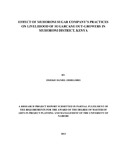| dc.description.abstract | A person’s livelihood refers to their “means of securing the necessities of life”, it
entails a set of economic activities, involving self employment or wage employment by
using ones endowment (both human and material) to generate adequate resources for
meeting their requirements of self and household on a sustainable basis with dignity.
Sugarcane out-growers’ livelihood depends on availability and accessibility of farm
production. There is little empirical evidence on effect sugar company practices on
livelihood of sugarcane out-growers that would facilitate evidence based planning, a gap
which the study intended to fill. The study sought to assess sugarcane out-growers views on
effect Muhoroni sugar Company practices on their livelihood in Muhoroni district, Kenya.
The study was guided by four objectives which included; to establish effect of company
practices on education of sugarcane out growers in Muhoroni district, to examine effect of
company practices on health of sugarcane out growers in Muhoroni district, to determine
effect of company practices on food security of sugarcane out growers in Muhoroni district,
to assess the effect of company practices on housing of sugarcane out-growers in Muhoroni
district. The study adopted descriptive survey research design to seek views of 370
sugarcane out-growers chosen by stratified random sampling technique from the target
population of 5000 sugarcane out-growers in four admistrative divisions in Muhoroni sub -
county namely Koru, Muhoroni, Chemelil and Fourt Tenan. Questionnaires were used in the
study for data collection. The quantitative data was analyzed using descriptive statistics
based on frequency distribution and percentage counts while qualitative data was organized
into various themes of the study and reported narratively. Statistical Package for Social
Sciences (SPSS) was used as tools for data analysis. The researcher came up with findings,
conclusion and recommendations that may influence policy formulation. The study findings
revealed that most sugarcane out –growers 216 (59%) were not satisfied with remuneration
offered by the company in terms of delay in remitting the cash and reluctance in reviewing
remuneration to be in tendon with the current economic reality, as a result majority of the
farmers were unable to sustain their children in school due to lack of school fees. The
findings also showed that majority of sugarcane out –growers 221(60.5%) cannot afford the
minimum number of three meals per day. On health, the study established that most cane
farmers 217(59.5%) preferred health facilities for their source of medication but the
problem was that majority at 259 ( 71%) could not afford the drugs prescribed by the
doctors . Further findings revealed that most farmers at 239(65.4%) rated the general
condition of their houses to be poor. Some of the conclusion drawn from the findings were
that most sugarcane out –growers were not able to educate their children due to delay in
payment by the company, most farmers were not able to afford meals as they desire, live in
bad houses and unable to afford drugs prescribed due to financial constraints. This study
recommends that the company improves the remuneration offered to farmers and make an
effort to release the cash in time to enable sugarcane out –growers have decent livelihood. | en |

